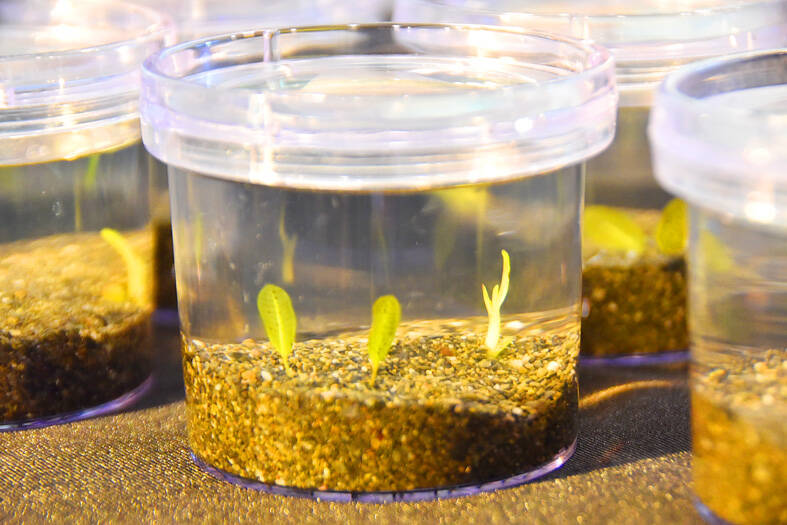Business Today on Tuesday launched an initiative in collaboration with academia and government agencies to reverse the loss of seaweed habitats in the seas around Taiwan.
Seaweeds in the nation’s waters are experiencing a precipitous decline, especially on the ocean floor around the Penghu islands, where kelp coverage has decreased by 96 percent, the Chinese-language weekly said.
The publication is to establish a center for seaweed recovery at National Taiwan University, working with associate professor of fisheries science Wu Yu-chi (吳育騏) and Nobel International Biotechnology founder Lee Kuan-cheng (李冠徵), it said.

Photo: Wu Po-hsuan, Taipei Times
The National Park Service — another partner of the initiative — is to build a gene bank for kelp species indigenous to the waters around the Pratas Islands (Dongsha Islands, 東沙群島), it said.
The service would gather 10,000 kelp seedlings and use the information to study factors affecting seaweed growth, it said.
Live samples would be replanted on the seabed near the Penghu islands in a bid to regrow the crucial kelp colony, it added.
Business Today president Liang Yung-huang (梁永煌) said the magazine has long been engaged in marine ecology projects, including cleanups that have removed 15,000 tonnes of trash from beaches since 2021.
This year’s program to protect the ocean environment and restore seaweed colonies is part of this commitment, Liang said.
National Park Service Director-General Wang Cheng-chi (王成機) said Dongsha Atoll National Park is home to Taiwan’s largest kelp colony.
Seaweed colonies in the ocean absorb large amounts of carbon and their health is a key factor in the effort to counter climate change, Wang said.
The service welcomes the private sector contributing to government-run kelp recovery programs in Kenting National Park and the Dongsha Atoll National Park, he said.
The Ocean Conservation Administration has been mapping the littoral and maritime environment since 2018, Deputy Director-General Shih Yi-che (施義哲) said.
The studies found that a seaweed colony off the Pratas Islands has a surface area of 7,000 hectares, he said, adding that Taiwan has 22 colonies with a combined size of 7,800 hectares.
Kelp plays a crucial role in carbon regulation, accounting for 85 percent of the nation’s blue carbon capacity, he said, referring to emissions captured by the ocean.
Penghu’s seaweeds are key to biodiversity as they sustain more than 70 species in the archipelago’s environs, said Chang Chin-yi (張錦宜), who heads the Penghu branch of the Fisheries Research Institute.
The livelihood of Penghu fishers and the culture of the islands depend on fish living off the local kelp colony, he said.
The government has restored 3,000m2 of seaweed coverage in the waters around the islands in the past decade, he added.
National Taiwan University College of Life Sciences dean Chiang Bor-luen (江伯倫) said that global warming’s impact on the seas would threaten the global food supply.
The public should be mindful of the need to conserve the ocean and act accordingly, he said.
Kelp colonies not only provide fish for the fishing industry, but also help the nation cope with rising sea levels by absorbing carbon and shielding the coastline, National Chung Hsing University professor of life science Lin Hsing-juh (林幸助) said.

ECHOVIRUS 11: The rate of enterovirus infections in northern Taiwan increased last week, with a four-year-old girl developing acute flaccid paralysis, the CDC said Two imported cases of chikungunya fever were reported last week, raising the total this year to 13 cases — the most for the same period in 18 years, the Centers for Disease Control (CDC) said yesterday. The two cases were a Taiwanese and a foreign national who both arrived from Indonesia, CDC Epidemic Intelligence Center Deputy Director Lee Chia-lin (李佳琳) said. The 13 cases reported this year are the most for the same period since chikungunya was added to the list of notifiable communicable diseases in October 2007, she said, adding that all the cases this year were imported, including 11 from

Prosecutors in New Taipei City yesterday indicted 31 individuals affiliated with the Chinese Nationalist Party (KMT) for allegedly forging thousands of signatures in recall campaigns targeting three Democratic Progressive Party (DPP) lawmakers. The indictments stem from investigations launched earlier this year after DPP lawmakers Su Chiao-hui (蘇巧慧) and Lee Kuen-cheng (李坤城) filed criminal complaints accusing campaign organizers of submitting false signatures in recall petitions against them. According to the New Taipei District Prosecutors Office, a total of 2,566 forged recall proposal forms in the initial proposer petition were found during the probe. Among those

The Mainland Affairs Council (MAC) today condemned the Chinese Communist Party (CCP) after the Czech officials confirmed that Chinese agents had surveilled Vice President Hsiao Bi-khim (蕭美琴) during her visit to Prague in March last year. Czech Military Intelligence director Petr Bartovsky yesterday said that Chinese operatives had attempted to create the conditions to carry out a demonstrative incident involving Hsiao, going as far as to plan a collision with her car. Hsiao was vice president-elect at the time. The MAC said that it has requested an explanation and demanded a public apology from Beijing. The CCP has repeatedly ignored the desires

The Ma-anshan Nuclear Power Plant’s license has expired and it cannot simply be restarted, the Executive Yuan said today, ahead of national debates on the nuclear power referendum. The No. 2 reactor at the Ma-anshan Nuclear Power Plant in Pingtung County was disconnected from the nation’s power grid and completely shut down on May 17, the day its license expired. The government would prioritize people’s safety and conduct necessary evaluations and checks if there is a need to extend the service life of the reactor, Executive Yuan spokeswoman Michelle Lee (李慧芝) told a news conference. Lee said that the referendum would read: “Do